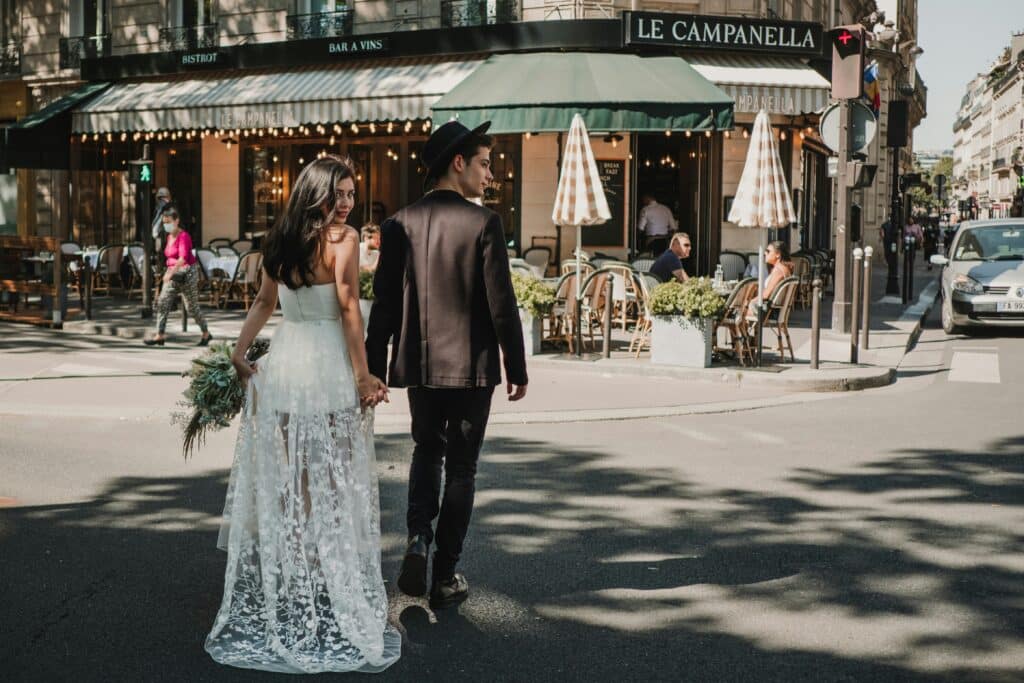
10 Ways to Say Congratulations in French
If you have French-speaking friends or coworkers, chances are you’ll want to congratulate them on some accomplishment or big life event.
It will mean even more to them if you can say it in their language!
In this post, I’ll show you 10 ways to say congratulations in French, including both informal and formal versions.
If you really want to celebrate like the French, don’t forget to bring the champagne!
Contents
- How to Say “Congratulations” in French
- Informal Ways to Say Congratulations
- Formal Ways to Say Congratulations
- “Congratulations” in Different Cultures
- And one more thing...
Download: This blog post is available as a convenient and portable PDF that you can take anywhere. Click here to get a copy. (Download)
How to Say “Congratulations” in French

1. Félicitations !
The standard phrase for “congratulations” in French is félicitations. This is a perfect example of a word that includes the French nasal sound “õ”—one of four more “unusual” vowel sounds for English speakers.
If you want to say congratulations to somebody, in French you use the preposition à followed by the person:
Félicitations à ton frère !
Congratulations to your brother!
And if you want to say congratulations on or for something, you use the preposition pour followed by the noun:
Félicitations pour ton nouveau travail ! Tu commences quand ?
Congratulations on your new job! When do you start?
To congratulate someone on doing something, you can use pour avoir followed by the past participle of the verb. For example:
Félicitations pour avoir terminé votre premier marathon ! Congratulations on completing your first marathon!
Informal Ways to Say Congratulations

Although not true 100% of the time, you may notice that the shorter ways to say “congratulations” in French tend to be informal and the longer ones formal.
The following phrases are for congratulating a friend or other people you know well.
2. Bravo ! (Congratulations/Well done!)
Bravo is probably the most standard of the informal ways to say “congratulations” in French, and it’s something you’ll hear a lot. Like félicitations, you can use it in most situations.
Let’s look at a dialogue:
Je viens de réussir mon examen.
I’ve just passed my exam.
Bravo !
Congratulations/well done!
If you want to say “Well done,” this expression and the next three will serve you well.
Note that while bien fait literally translates to “Well done,” it means something more like “Serves you right” and is used as a taunt. Take it from me and avoid this mistake!
3. Chapeau ! (Congratulations/Well done/lit. Hats off to you!)
Chapeau is arguably more old-fashioned than bravo and slightly less versatile. It’s often used to say congratulations for minor successes, such as resolving an argument or cooking a tasty meal.
Les soufflés sont parfaits !
The soufflés are perfect!
Chapeau ! Ils ont l’air savoureux.
Congratulations! They look tasty.
French friends have occasionally sent me a hat emoji when I’ve told them about something successful in my life, so this is a modern interpretation to look out for!
4. Bien joué ! (Congratulations/Well done/ lit. Well played!)
As you might expect, bien joué can relate to the world of sports in the same way it does in English.
But it can also be used whenever you want to say congratulations to someone in a very informal context; particularly when wanting to compliment them on the way they did something.
J’ai fait descendre le chaton de l’arbre sans lui faire de mal.
I brought the kitten down from the tree without hurting him.
Ouf, bien joué !
Phew, well done!
You’ll often hear bien joué said ironically, so if you think someone isn’t really congratulating you, they probably aren’t!
5. Trop fort ! (Very good!/Awesome!)
This phrase literally translates to “too strong,” but we use it as a colloquial expression to convey admiration or congratulations for someone’s achievement, usually among friends or peers.
Tu as réussi à décrocher ce contrat ? Trop fort ! (You managed to land that contract? Awesome!)
6. Bon + [noun] (Good…)
You can also use the adjective bon (good) before a noun—especially when you want to congratulate someone on something specific. For example:
Bon travail les gars !
Good work, guys!
Bonne réussite !
Great success!
Note: the masculine bon becomes bonne before a feminine noun.
Formal Ways to Say Congratulations

Use the following phrases when you need to curb your enthusiasm, including in professional situations and in writing.
7. Féliciter (To congratulate)
As in English, to congratulate someone in a formal way either in speech or writing, we can simply use the verb “to congratulate” or féliciter in French.
Je vous félicite pour l’obtention de votre doctorat.
I congratulate you on receiving your PhD.
We can also make this verb reflexive to say that we congratulate ourselves ( se féliciter — to congratulate oneself). For example:
Je me félicite pour la réalisation de mon projet !
I’m giving myself a pat on the back for the completion of my project!
8. Tous mes compliments / Tous nos compliments (Sincere congratulations)
This is a very formal way to express your congratulations in French. Though it’s possible to hear people say it, it’s commonly used in writing to someone you don’t know well or in a professional situation.
Tous mes compliments pour votre rapport.
Sincere congratulations on your report.
9. Je tiens à vous féliciter pour… (I must/should congratulate you for…)
You can use this phrase when you want to really emphasize your congratulations in a formal situation. You might say this if someone made a great achievement or benefited a group of people working towards the same goal.
Je tiens à vous féliciter pour votre dévouement à l’entreprise.
I must congratulate you for your dedication to the company.
10. Tous mes vœux de bonheur (All my wishes of happiness)
This is a French expression we use to convey best wishes. It’s commonly used in contexts such as weddings, birthdays, anniversaries and other celebratory occasions, so it can be both formal or informal depending on the context.
Tous mes vœux de bonheur pour votre mariage ! Que votre vie à deux soit remplie de joie et d’amour.
All my wishes of happiness for your wedding! May your life together be filled with joy and love.
If you aren’t sure when to use some of these expressions, you can watch them being used by native speakers with the FluentU program.
FluentU takes authentic videos—like music videos, movie trailers, news and inspiring talks—and turns them into personalized language learning lessons.
You can try FluentU for free for 2 weeks. Check out the website or download the iOS app or Android app.
P.S. Click here to take advantage of our current sale! (Expires at the end of this month.)
“Congratulations” in Different Cultures
It’s good to keep in mind that French is spoken in many countries outside of France. So if you’re planning to visit a French-speaking country that isn’t France, remember there’s also a cultural part to play.
They might not use the same slang or informal ways to say congratulations. You can always ask if you’re not sure! Or just pay close attention to what the locals say.
I also should note that the French are arguably more blasé or indifferent when it comes to showing excitement, and you might find that some individuals won’t express themselves in the same way you’d expect in your own country—just something to bear in mind.
As we’ve seen, saying congratulations in French can be tricky to navigate as it breaches both worlds of informal and formal.
Yet with practice, this will become second nature and with time you’ll know exactly how to express your congratulations in French in all manner of situations!
Download: This blog post is available as a convenient and portable PDF that you can take anywhere. Click here to get a copy. (Download)
And one more thing...
If you like learning French on your own time and from the comfort of your smart device, then I'd be remiss to not tell you about FluentU.
FluentU has a wide variety of great content, like interviews, documentary excerpts and web series, as you can see here:

FluentU brings native French videos with reach. With interactive captions, you can tap on any word to see an image, definition and useful examples.

For example, if you tap on the word "crois," you'll see this:

Practice and reinforce all the vocabulary you've learned in a given video with learn mode. Swipe left or right to see more examples for the word you’re learning, and play the mini-games found in our dynamic flashcards, like "fill in the blank."

All throughout, FluentU tracks the vocabulary that you’re learning and uses this information to give you a totally personalized experience. It gives you extra practice with difficult words—and reminds you when it’s time to review what you’ve learned.
Start using the FluentU website on your computer or tablet or, better yet, download the FluentU app from the iTunes or Google Play store. Click here to take advantage of our current sale! (Expires at the end of this month.)



